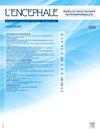Treatment resistant depression: A case of Muenke syndrome
IF 1
4区 医学
Q4 NEUROSCIENCES
Encephale-Revue De Psychiatrie Clinique Biologique et Therapeutique
Pub Date : 2025-06-01
DOI:10.1016/j.encep.2024.10.006
引用次数: 0
Abstract
Major depressive disorder is a complex neuropsychiatric disorder and one of the leading causes of disability in developed countries. Treatment-resistant depression is defined as the failure of at least two adequate treatment trials. The Muenke Syndrome is an autosomal dominant disorder caused by a mutation of the fibroblast growth factor receptor 3 (FGFR3). The fibroblast growth factor (FGF) family has often been implicated in mood disorders in the literature. We present here the case of a patient with a treatment-resistant depression and a concomitant Muenke Syndrome. We propose a relationship between the two pathologies as the expression of the FGF family has been shown to be dysregulated in depressed humans, post-mortem depressed human's brains and rodent's models of depression and anxiety. In particular, FGFR3 and its major ligand, FGF9, had been shown to be down-regulated and up-regulated, respectively, in cortical areas implicated in mood disorders. Since the FGF family plays a key role in neurodevelopment and neuroplasticity, among others things, a genetic mutation in a member of the family, such as FGFR3, could lead to depressive symptoms, as in our reported case. The implication is that the FGF family may be an important target for the treatment of neuropsychiatric disorders. We also conclude that depressive symptoms should be investigated in cases of Muenke Syndrome, as FGF dysregulation in depressed patients.
治疗难治性抑郁症:Muenke综合征1例。
重度抑郁症是一种复杂的神经精神障碍,也是发达国家致残的主要原因之一。难治性抑郁症被定义为至少两次适当的治疗试验失败。Muenke综合征是一种常染色体显性遗传病,由成纤维细胞生长因子受体3 (FGFR3)突变引起。在文献中,成纤维细胞生长因子(FGF)家族经常与情绪障碍有关。我们在这里提出的情况下,病人的治疗抵抗性抑郁症和伴随Muenke综合征。我们提出了两种病理之间的关系,因为FGF家族的表达在抑郁症患者、死后抑郁症患者的大脑和啮齿动物的抑郁和焦虑模型中被证明是失调的。特别是,FGFR3及其主要配体FGF9在与情绪障碍有关的皮质区域分别被下调和上调。由于FGF家族在神经发育和神经可塑性中起着关键作用,除其他外,该家族成员的基因突变,如FGFR3,可能导致抑郁症状,就像我们报道的病例一样。这意味着FGF家族可能是治疗神经精神疾病的重要靶点。我们还得出结论,抑郁症状应该在Muenke综合征的病例中进行调查,因为抑郁症患者的FGF失调。
本文章由计算机程序翻译,如有差异,请以英文原文为准。
求助全文
约1分钟内获得全文
求助全文
来源期刊
CiteScore
4.60
自引率
7.40%
发文量
162
审稿时长
6-12 weeks
期刊介绍:
Une revue française de renommée internationale.
- Un comite de rédaction représentant tous les aspects de la prise en charge psychiatrique du patient.
- Une sélection rigoureuse d''articles faisant l''objet de plusieurs expertises.
- Des travaux d''auteurs et de chercheurs de renommée internationale.
- Des indexations dans les grandes bases de données (Current Contents, Excerpta Medica, etc.).
- Un facteur d''impact qui témoigne de la grande notoriété de la revue.
La tribune des publications originales de haut niveau.
- Une très grande diversité des sujets traités, rigoureusement sélectionnés à travers des sommaires dynamiques :
- des éditoriaux de médecins référents,
- une revue de presse sur les actualités internationales,
- des articles originaux pour approfondir vos connaissances,
- des mises au point et des cas cliniques pour engager votre réflexion sur les indications et choix possibles au travers de mises en situation clinique,
- des dossiers thématiques pour faire le tour d''une question.
- L''actualité de l''AFPB : L''Encéphale publie régulièrement des comptes rendus de l''Association française de psychiatrie clinique.

 求助内容:
求助内容: 应助结果提醒方式:
应助结果提醒方式:


